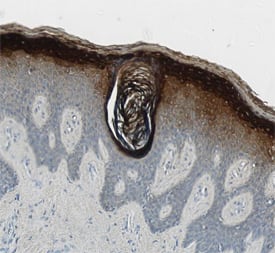Human Corneodesmosin Antibody
R&D Systems, part of Bio-Techne | Catalog # AF5725


Key Product Details
Species Reactivity
Validated:
Human
Cited:
Human
Applications
Validated:
Immunohistochemistry
Cited:
Immunohistochemistry, Immunohistochemistry-Paraffin
Label
Unconjugated
Antibody Source
Polyclonal Sheep IgG
Product Specifications
Immunogen
Mouse myeloma cell line NS0-derived recombinant human Corneodesmosin
Lys33-Pro529 (Ser153 del)
Accession # NP_001255
Lys33-Pro529 (Ser153 del)
Accession # NP_001255
Specificity
Detects human Corneodesmosin in direct ELISAs and Western blots.
Clonality
Polyclonal
Host
Sheep
Isotype
IgG
Scientific Data Images for Human Corneodesmosin Antibody
Corneodesmosin in Human Skin.
Corneodesmosin was detected in immersion fixed paraffin-embedded sections of human skin using Sheep Anti-Human Corneodesmosin Antigen Affinity-purified Polyclonal Antibody (Catalog # AF5725) at 1.7 µg/mL overnight at 4 °C. Tissue was stained using the Anti-Sheep HRP-DAB Cell & Tissue Staining Kit (brown; Catalog # CTS019) and counterstained with hematoxylin (blue). View our protocol for Chromogenic IHC Staining of Paraffin-embedded Tissue Sections.Applications for Human Corneodesmosin Antibody
Application
Recommended Usage
Immunohistochemistry
5-15 µg/mL
Sample: Immersion fixed paraffin-embedded sections of human skin
Sample: Immersion fixed paraffin-embedded sections of human skin
Formulation, Preparation, and Storage
Purification
Antigen Affinity-purified
Reconstitution
Reconstitute at 0.2 mg/mL in sterile PBS. For liquid material, refer to CoA for concentration.
Formulation
Lyophilized from a 0.2 μm filtered solution in PBS with Trehalose. *Small pack size (SP) is supplied either lyophilized or as a 0.2 µm filtered solution in PBS.
Shipping
Lyophilized product is shipped at ambient temperature. Liquid small pack size (-SP) is shipped with polar packs. Upon receipt, store immediately at the temperature recommended below.
Stability & Storage
Use a manual defrost freezer and avoid repeated freeze-thaw cycles.
- 12 months from date of receipt, -20 to -70 °C as supplied.
- 1 month, 2 to 8 °C under sterile conditions after reconstitution.
- 6 months, -20 to -70 °C under sterile conditions after reconstitution.
Background: Corneodesmosin
References
- Pierard, G.E. et al. (2000) Int. J. Mol. Med. 6:217.
- Zhou, Y. and D.D. Chaplin (1993) Proc. Natl. Acad. Sci. USA 90:9470.
- Haftek, M. et al. (1997) Br. J. Dermatol. 137:864.
- Simon, M. et al. (1997) J. Biol. Chem. 272:31770.
- Mils, V. et al. (1992) J. Histochem. Cytochem. 40:1329.
- Matsumoto, M. et al. (2008) Proc. Natl. Acad. Sci. USA 105:6720.
- Guerrin, M. et al. (1998) J. Biol. Chem. 273:22640.
- Jonca, N. et al. (2002) J. Biol. Chem. 277:5024.
- Caubet, C. et al. (2004) J. Invest. Dermatol. 122:747.
- Leclerc, E.A. et al. (2009) J. Cell Sci. 122:2699.
- Simon, M. et al. (2001) J. Biol. Chem. 276:20292.
- Simon, M. et al. (2008) Br. J. Dermatol. 159:77.
- Levy-Nissenbaum, E. et al. (2003) Nat. Genet. 34:151.
Alternate Names
CDSN, D6S586E, HTSS
Gene Symbol
CDSN
UniProt
Additional Corneodesmosin Products
Product Documents for Human Corneodesmosin Antibody
Product Specific Notices for Human Corneodesmosin Antibody
For research use only
